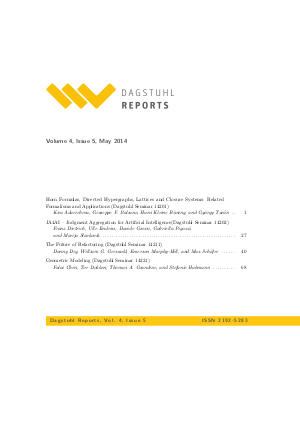Dagstuhl Reports, Volume 4, Issue 5
-
Part of:
Volume:
Dagstuhl Reports, Volume 4
Journal: Dagstuhl Reports (DagRep)

Event
- Dagstuhl Seminars 14201, 14202, 14211, 14221
Publication Details
- published at: 2014-09-12
- Publisher: Schloss Dagstuhl – Leibniz-Zentrum für Informatik
- DBLP: db/journals/dagstuhl-reports/dagstuhl-reports4
Access Numbers
- Detailed Access Statistics available here
-
Total Document Accesses (updated on a weekly basis):
0PDF Downloads
Documents
Dagstuhl Reports, Volume 4, Issue 5, May 2014, Complete Issue
Abstract
Cite as
Dagstuhl Reports, Volume 4, Issue 5, Schloss Dagstuhl – Leibniz-Zentrum für Informatik (2014)
Copy BibTex To Clipboard
@Article{DagRep.4.5,
title = {{Dagstuhl Reports, Volume 4, Issue 5, May 2014, Complete Issue}},
journal = {Dagstuhl Reports},
ISSN = {2192-5283},
year = {2014},
volume = {4},
number = {5},
publisher = {Schloss Dagstuhl -- Leibniz-Zentrum f{\"u}r Informatik},
address = {Dagstuhl, Germany},
URL = {https://drops.dagstuhl.de/entities/document/10.4230/DagRep.4.5},
URN = {urn:nbn:de:0030-drops-47887},
doi = {10.4230/DagRep.4.5},
annote = {Keywords: Dagstuhl Reports, Volume 4, Issue 5, May 2014, Complete Issue}
}
Dagstuhl Reports, Table of Contents, Volume 4, Issue 5, 2014
Abstract
Cite as
Dagstuhl Reports, Volume 4, Issue 5, pp. i-ii, Schloss Dagstuhl – Leibniz-Zentrum für Informatik (2014)
Copy BibTex To Clipboard
@Article{DagRep.4.5.i,
title = {{Dagstuhl Reports, Table of Contents, Volume 4, Issue 5, 2014}},
pages = {i--ii},
journal = {Dagstuhl Reports},
ISSN = {2192-5283},
year = {2014},
volume = {4},
number = {5},
publisher = {Schloss Dagstuhl -- Leibniz-Zentrum f{\"u}r Informatik},
address = {Dagstuhl, Germany},
URL = {https://drops.dagstuhl.de/entities/document/10.4230/DagRep.4.5.i},
URN = {urn:nbn:de:0030-drops-47872},
doi = {10.4230/DagRep.4.5.i},
annote = {Keywords: Table of Contents, Frontmatter}
}
Horn formulas, directed hypergraphs, lattices and closure systems: related formalisms and applications (Dagstuhl Seminar 14201)
Abstract
Cite as
Kira V. Adaricheva, Giuseppe F. Italiano, Hans Kleine Büning, and György Turán. Horn formulas, directed hypergraphs, lattices and closure systems: related formalisms and applications (Dagstuhl Seminar 14201). In Dagstuhl Reports, Volume 4, Issue 5, pp. 1-26, Schloss Dagstuhl – Leibniz-Zentrum für Informatik (2014)
Copy BibTex To Clipboard
@Article{adaricheva_et_al:DagRep.4.5.1,
author = {Adaricheva, Kira V. and Italiano, Giuseppe F. and Kleine B\"{u}ning, Hans and Tur\'{a}n, Gy\"{o}rgy},
title = {{Horn formulas, directed hypergraphs, lattices and closure systems: related formalisms and applications (Dagstuhl Seminar 14201)}},
pages = {1--26},
journal = {Dagstuhl Reports},
ISSN = {2192-5283},
year = {2014},
volume = {4},
number = {5},
editor = {Adaricheva, Kira V. and Italiano, Giuseppe F. and Kleine B\"{u}ning, Hans and Tur\'{a}n, Gy\"{o}rgy},
publisher = {Schloss Dagstuhl -- Leibniz-Zentrum f{\"u}r Informatik},
address = {Dagstuhl, Germany},
URL = {https://drops.dagstuhl.de/entities/document/10.4230/DagRep.4.5.1},
URN = {urn:nbn:de:0030-drops-46193},
doi = {10.4230/DagRep.4.5.1},
annote = {Keywords: Horn formulas, directed hypergraphs, lattices, closure system, data bases, implicational systems and concept analysis}
}
JA4AI – Judgment Aggregation for Artificial Intelligence (Dagstuhl Seminar 14202)
Abstract
Cite as
Franz Dietrich, Ulle Endriss, Davide Grossi, Gabriella Pigozzi, and Marija Slavkovik. JA4AI – Judgment Aggregation for Artificial Intelligence (Dagstuhl Seminar 14202). In Dagstuhl Reports, Volume 4, Issue 5, pp. 27-39, Schloss Dagstuhl – Leibniz-Zentrum für Informatik (2014)
Copy BibTex To Clipboard
@Article{dietrich_et_al:DagRep.4.5.27,
author = {Dietrich, Franz and Endriss, Ulle and Grossi, Davide and Pigozzi, Gabriella and Slavkovik, Marija},
title = {{JA4AI – Judgment Aggregation for Artificial Intelligence (Dagstuhl Seminar 14202)}},
pages = {27--39},
journal = {Dagstuhl Reports},
ISSN = {2192-5283},
year = {2014},
volume = {4},
number = {5},
editor = {Dietrich, Franz and Endriss, Ulle and Grossi, Davide and Pigozzi, Gabriella and Slavkovik, Marija},
publisher = {Schloss Dagstuhl -- Leibniz-Zentrum f{\"u}r Informatik},
address = {Dagstuhl, Germany},
URL = {https://drops.dagstuhl.de/entities/document/10.4230/DagRep.4.5.27},
URN = {urn:nbn:de:0030-drops-46791},
doi = {10.4230/DagRep.4.5.27},
annote = {Keywords: Judgment Aggregation, Artificial Intelligence, Computational Social Choice, Collective Decision-making}
}
The Future of Refactoring (Dagstuhl Seminar 14211)
Abstract
Cite as
Danny Dig, William G. Griswold, Emerson Murphy-Hill, and Max Schäfer. The Future of Refactoring (Dagstuhl Seminar 14211). In Dagstuhl Reports, Volume 4, Issue 5, pp. 40-67, Schloss Dagstuhl – Leibniz-Zentrum für Informatik (2014)
Copy BibTex To Clipboard
@Article{dig_et_al:DagRep.4.5.40,
author = {Dig, Danny and Griswold, William G. and Murphy-Hill, Emerson and Sch\"{a}fer, Max},
title = {{The Future of Refactoring (Dagstuhl Seminar 14211)}},
pages = {40--67},
journal = {Dagstuhl Reports},
ISSN = {2192-5283},
year = {2014},
volume = {4},
number = {5},
editor = {Dig, Danny and Griswold, William G. and Murphy-Hill, Emerson and Sch\"{a}fer, Max},
publisher = {Schloss Dagstuhl -- Leibniz-Zentrum f{\"u}r Informatik},
address = {Dagstuhl, Germany},
URL = {https://drops.dagstuhl.de/entities/document/10.4230/DagRep.4.5.40},
URN = {urn:nbn:de:0030-drops-46807},
doi = {10.4230/DagRep.4.5.40},
annote = {Keywords: Refactoring}
}
Geometric Modeling (Dagstuhl Seminar 14221)
Abstract
Cite as
Falai Chen, Tor Dokken, Thomas A. Grandine, and Stefanie Hahmann. Geometric Modeling (Dagstuhl Seminar 14221). In Dagstuhl Reports, Volume 4, Issue 5, pp. 68-94, Schloss Dagstuhl – Leibniz-Zentrum für Informatik (2014)
Copy BibTex To Clipboard
@Article{chen_et_al:DagRep.4.5.68,
author = {Chen, Falai and Dokken, Tor and Grandine, Thomas A. and Hahmann, Stefanie},
title = {{Geometric Modeling (Dagstuhl Seminar 14221)}},
pages = {68--94},
journal = {Dagstuhl Reports},
ISSN = {2192-5283},
year = {2014},
volume = {4},
number = {5},
editor = {Chen, Falai and Dokken, Tor and Grandine, Thomas A. and Hahmann, Stefanie},
publisher = {Schloss Dagstuhl -- Leibniz-Zentrum f{\"u}r Informatik},
address = {Dagstuhl, Germany},
URL = {https://drops.dagstuhl.de/entities/document/10.4230/DagRep.4.5.68},
URN = {urn:nbn:de:0030-drops-46815},
doi = {10.4230/DagRep.4.5.68},
annote = {Keywords: Geometric modeling, material modeling, locally refinable splines, isogeometric analysis, mesh processing, algebraic methods}
}